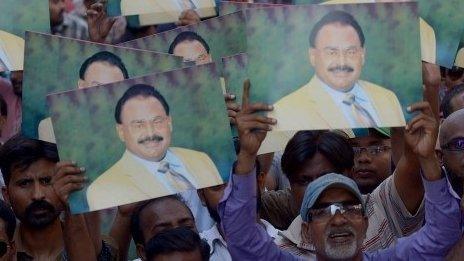The MQM leader taking on Altaf Hussain in Karachi
- Published
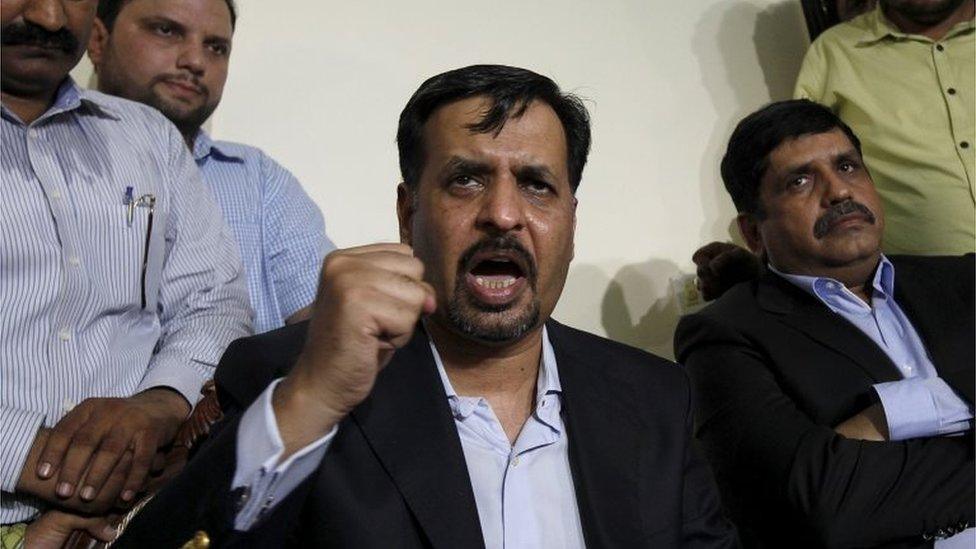
Mustafa Kamal was MQM mayor of Karachi for five years and a close supporter of Altaf Hussain
Outside a house in an affluent seaside neighbourhood of Karachi, several satellite trucks are parked in a row.
The place is swarming with media. Television hosts from Pakistan's numerous political talk shows are jostling for their "exclusive" interviews.
The media frenzy is met by heightened security around the house: recently installed barbed wire, CCTV cameras and iron gates. A full body search is conducted before visitors are allowed in.
The place serves as the headquarters of a breakaway group from Karachi's biggest political party, the MQM.
It is a risky gamble and seemingly the first organised attempt in more than two decades to take on Altaf Hussain, the MQM's founding leader who has lived in self-imposed exile in London for the last 24 years.
Mr Hussain is a maverick politician who has encouraged a personality cult to build up around him.
He maintains a firm grip over the party, and through it, on Pakistan's financial capital.
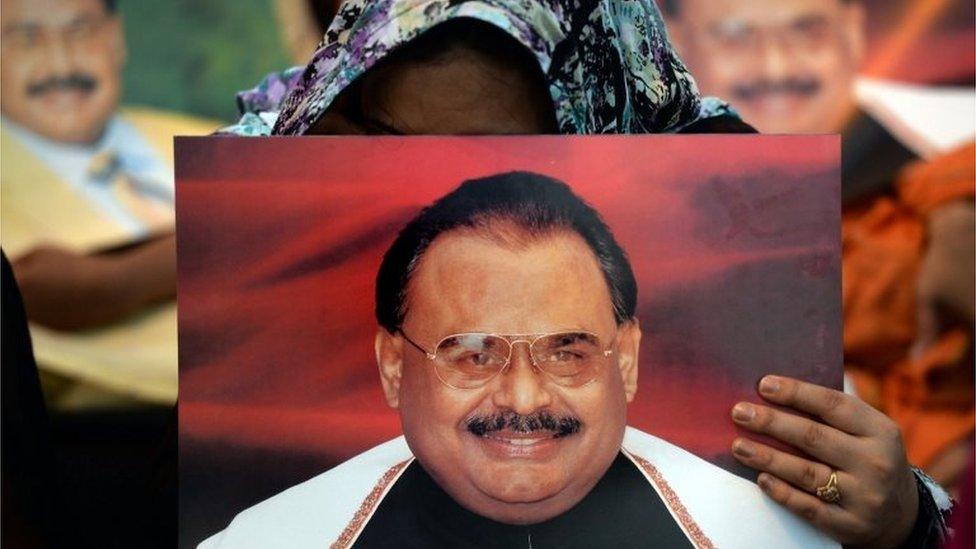
Altaf Hussain has controlled the MQM and Karachi from London for years
Over the years, potential dissenters have been eliminated - sometimes physically, opponents allege, although the MQM has always denied allegations of murder.
The man leading the latest rebellion is Mustafa Kamal, the party's former elected mayor of Karachi. Posters displayed at the main gate of his camp office declare him "a ray of hope".
"We have been inundated with phone calls and messages of support. The response has been overwhelming," he says as he sits down with me after a hectic day of back-to-back meetings and television interviews.
It is around midnight, but far from being exhausted he appears driven and energised.
"This city and this country have suffered enough bloodshed because of the greed and disloyalty of one man playing with its fate from London.
"We are here to say: enough is enough. Karachi and Pakistan deserve better," he says.

What is MQM?
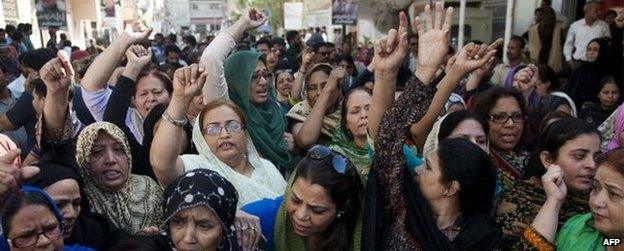
1984: Founded as the party of Urdu-speakers who migrated from India at the time of the 1947 partition, known as Muhajir
1988: Wins all seats in Karachi, becoming Pakistan's third largest party
1992: Party chief Altaf Hussain leaves country after an arrest warrant is issued in a murder case; army claims to have busted "torture cells" used by MQM activists to punish opponents
2004: Emerges as major ally of military ruler General Pervez Musharraf
2009: Under a 2009 amnesty in Pakistan 72 cases are dropped against Altaf Hussain, including 31 allegations of murder
2014: London police raid the home of Altaf Hussain, who still controls the party, and investigate claims of money laundering and murder

Karachi is Pakistan's most diverse, multi-ethnic, economic engine.
The MQM has dominated the city's politics for three decades because of its support in the densely populated working class neighbourhoods of Urdu-speaking Muhajirs, descendants of Muslims who migrated from India when Pakistan was created in 1947.
Mustafa Kamal was once a blue-eyed supporter of Mr Hussain. He was handpicked by the party leader to become elected mayor of Karachi from 2005-2010.
Young, dynamic and some say hot-headed, he was an MQM senator and a central leader of the party when he resigned in 2013 and quietly left the country.
He later ended up in Dubai, working for one of Pakistan's largest property developers, Bahria Town.
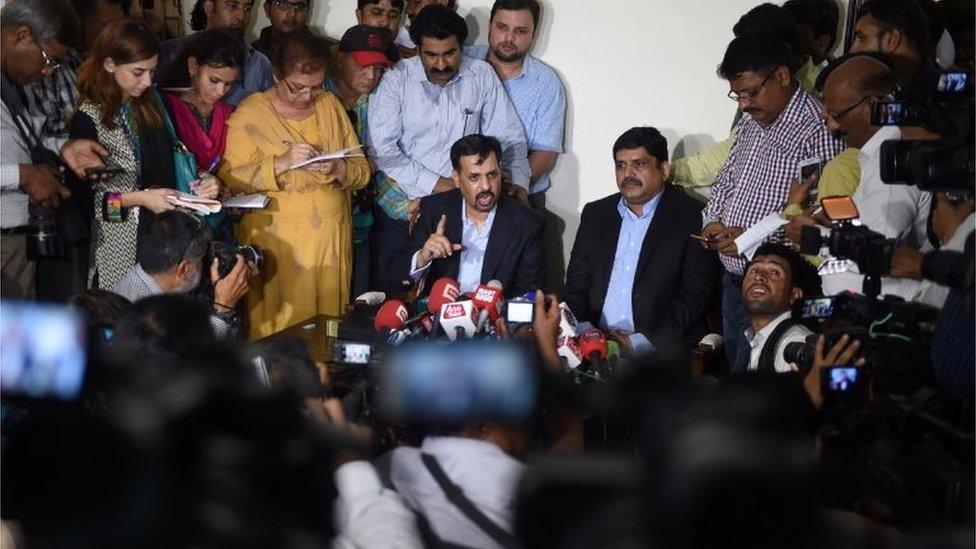
How much electoral support Mr Kamal has remains unclear
His return on 3 March appeared sudden, but well-choreographed. He says it was "a call of conscience" but critics suspect the initiative is backed by the Pakistani army.
The country's main intelligence agency, the ISI, has a track record of interfering in Pakistan's domestic politics, rigging elections, orchestrating party splits and sponsoring political alliances.
Since they burst onto the national scene, Mr Kamal and his group of dissidents have attacked their former boss in London for his alleged links with the Indian intelligence agency, RAW.
They have denounced what they say is his flip-flop approach to policy, his threats and abuse towards the army and his alleged incitement to violence against opponents.
None of the allegations are particularly shocking or revealing.
'Media trial'
The more serious ones, that the party bosses received funding from Indian intelligence, have been in the public domain for quite some time but are yet to be proven in a court of law.
"The allegation has been used repeatedly as a stick to beat us with and to paint us as unpatriotic," says Dr Farooq Sattar, a senior MQM leader.
"And yet, despite the continuous media trial, people have continued to vote for us."
MQM insiders accept that there has been persist frustration within the senior ranks about the way party affairs have been managed from London.
There, Mr Hussain has been under pressure from the British authorities, facing a variety of allegations - all of which he denies - including an investigation into money laundering.
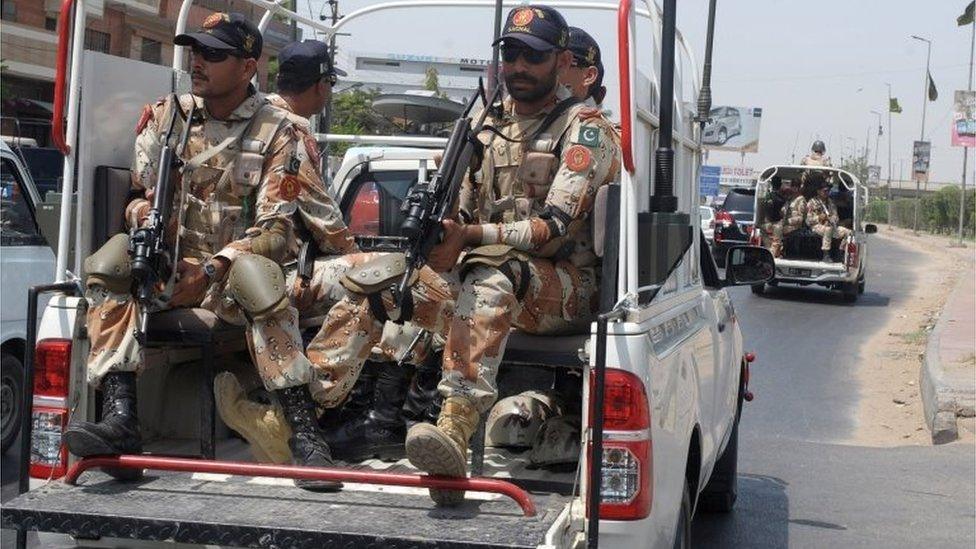
Soldiers patrol Karachi after the arrest in London of Altaf Hussain in June 2014
Separately, British officials are investigating the murder of a senior MQM leader, Dr Imran Farooq, who was stabbed to death in London in 2010.
Some claimed that his death was a politically motivated killing because at the time, Dr Farooq was reportedly planning to break away from Mr Hussain and start his own party.
Party insiders say the legal challenges, increased scrutiny of the party's finances and a lifestyle of indulgence has taken a big toll on Mr Hussain's health.
But despite battling on multiple fronts, his appeal and the vote bank has stayed intact. In fact, in December 2015, the MQM won the local government election with a huge margin in Karachi and other urban areas of Sindh province.
"We are not a perfect party," concedes an MQM member of parliament. "There's much we would like to change about ourselves. But it has to come from within. External attempts to force reform will fail."
For now, the party has decided to play it cool in the face of the latest challenge, calling it "a storm in a tea-cup". Instead, it is focusing its energies on a waste collection drive on the streets of Karachi.
As for Mr Kamal, it is unclear how he intends to take his campaign beyond the television talk shows. He says he is not in a rush.
Pakistan's next elections are not due for another two years. Mr Kamal says he intends to use that time and space to organise his as-yet unnamed new party and to reach out to all Pakistanis.
His first real test of popular support will come when he leaves the secure confines of his camp office and ventures out on the streets of the city where Altaf Hussain, despite all his problems, still enjoys a significant loyal following.
- Published24 June 2015
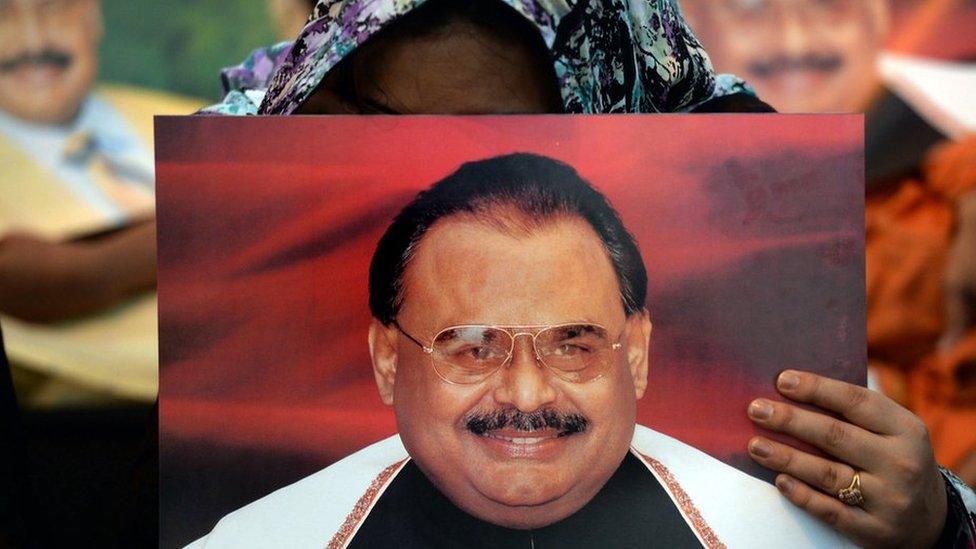
- Published11 March 2015
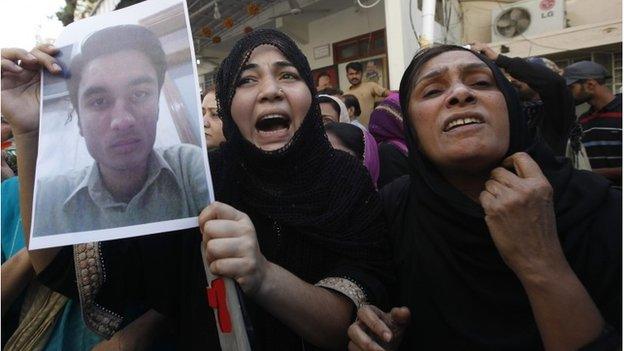
- Published3 June 2014
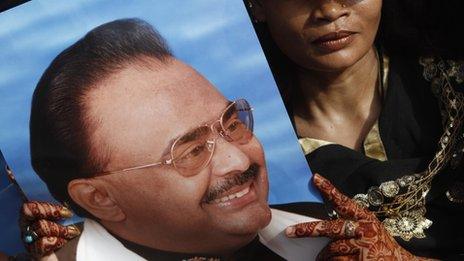
- Published12 July 2013
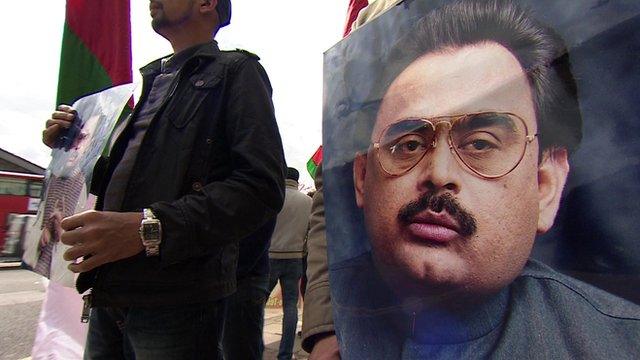
- Published3 June 2014
